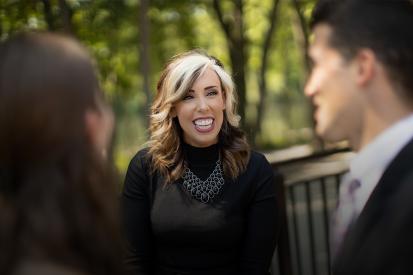Ohio County Agrees to Respect Christian Minister’s Freedom


Since she was young, Kristi Stokes has shared her faith and ministered to others. She has served as a missionary in Zimbabwe, helped the homeless in Cleveland, and preached to churches in Ohio. After becoming an ordained minister and wife, Kristi wanted to minister through her business, Covenant Weddings, which officiates weddings and composes wedding homilies, vows, and prayers on a commission basis.
But a public-accommodation law in Cuyahoga County threatened Kristi and her business and could have required her to officiate and compose homilies, vows, and prayers for same-sex weddings if she officiated or promoted weddings between one man and one woman. The law also made it illegal for her to explain on her own website and social media accounts the religious reasons why she only celebrates weddings between one man and one woman—or else incur steep fines. So Kristi challenged the law before it could be enforced against her.
The county’s law resembled a similar ordinance passed by the city of Coeur d’Alene, Idaho that threatened a wedding business run by a pair of Christian ministers named Donald and Evelyn Knapp. City officials in Coeur d’Alene publicly announced and told the Knapps that the city’s public-accommodation law would require them to officiate same-sex weddings. Alliance Defending Freedom filed suit on behalf of the Knapps, which led the city to back down and agree not to apply its ordinance against the Knapps going forward.
Governments shouldn’t force people to celebrate events that conflict with their deeply held religious beliefs. That’s true of Coeur d’Alene, and it’s true of Cuyahoga County. Thankfully, with swift action from ADF, the county agreed not to enforce its law against Covenant Weddings.
What did Cuyahoga County’s law do?
Cuyahoga County Code Title 15 forbids businesses from discriminating on the basis of sexual orientation and gender identity. If applied to Kristi, though, the law could have required her to officiate and celebrate same-sex weddings or affirm gender identities contrary to one’s biological sex—or else be fined $1000-$5000 per violation and be threatened with investigation and expensive legal fees.
Like other ministers, Kristi chooses which weddings to officiate and write about based on her faith and whether the messages she would express align with her faith. While Kristi works with and conveys God’s love to everyone no matter who they are, including those who identify as LGBT, she can only celebrate weddings consistent with her beliefs.
Can governments compel ministers or businesses like Kristi’s to promote same-sex weddings?
No. The First Amendment protects Kristi’s freedom to choose which messages to express consistent with her deeply held beliefs. It also protects her ability to participate in religious ceremonies like weddings that align with her Christian faith.
The U.S. Supreme Court has consistently affirmed these principles. Most recently, in its 2023 decision 303 Creative v. Elenis (another ADF case), the High Court ruled that the government cannot use public-accommodation laws to force individuals or businesses to express messages inconsistent with their beliefs.
Thankfully, just 3 months after Kristi’s lawsuit was filed, Cuyahoga County agreed in a court judgment not to compel Kristi to “offer officiating and writing services against [her] sincerely held religious beliefs.” The judgment states that Kristi’s business does not qualify as a place of public accommodation, and that even if it did, the county could not compel Kristi (or any other minister) to “officiate or solemnize weddings against their sincerely held religious beliefs” or “author specific prayers, homilies, vows, or other writings” that are inconsistent with those same beliefs.
Case timeline
- July 2020: ADF filed a federal complaint on behalf of Kristi and her business, Covenant Weddings, challenging a Cuyahoga County law that would have forced her to use her ministry and business to officiate and compose homilies, vows, and prayers for same-sex weddings if she officiated or promoted weddings between one man and one woman.
- October 2020: Cuyahoga County agreed to let Kristi and her business operate consistent with her belief that marriage is the union of a man and a woman.
